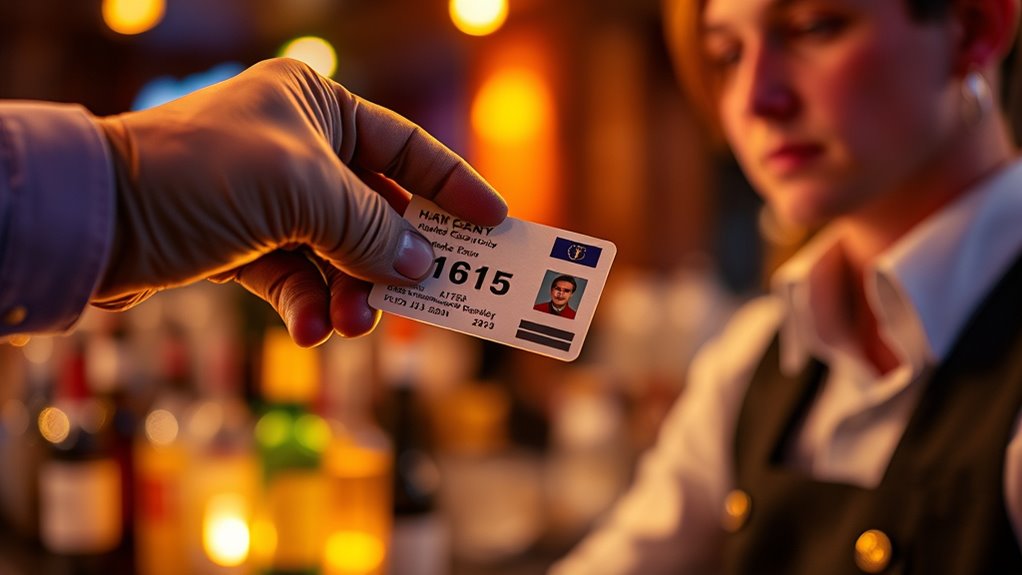To guarantee alcohol service compliance, you must verify IDs thoroughly by checking that they display a clear photo, date of birth, and expiration date. Always match the ID to the person presenting it and confirm it’s valid. Be attentive to signs of minors or intoxicated patrons, refusing service when needed. Proper training and diligent observation help maintain safety and follow legal standards. Continuing will provide you with more essential tips for responsible service practices.
Key Takeaways
- Verify that IDs are valid, unexpired, and clearly display the holder’s date of birth and expiration date.
- Confirm the ID belongs to the individual presenting it through thorough examination.
- Familiarize with area-specific ID requirements, such as driver’s licenses and passports.
- Focus on photographs and DOB details to accurately identify minors and prevent underage service.
- Regularly train staff on ID verification procedures to ensure compliance and responsible alcohol service.

Ensuring alcohol service compliance is indispensable for maintaining legal and safety standards in any establishment that serves alcohol. One of your primary responsibilities is checking legal age before serving anyone. This means you need to familiarize yourself with the specific identification requirements in your area, such as state-issued driver’s licenses, passports, or other government-issued IDs that clearly display the holder’s date of birth. When someone orders a drink, you must verify their age promptly and accurately. Don’t just glance at the ID; take the time to examine the photograph, date of birth, and expiration date to ensure the ID is valid and belongs to the individual presenting it. This step is crucial because serving minors can lead to hefty fines, license suspension, or even legal action against your establishment.
Handling intoxicated patrons is another essential aspect of compliance. If someone appears visibly intoxicated, it’s your duty to refuse service, regardless of how much they insist they’re okay to drink. Recognize the signs of intoxication, such as slurred speech, unsteady gait, or impaired judgment. Instead of risking their safety or your license, tactfully inform the patron that you cannot serve them any more alcohol. Offer non-alcoholic options or suggest they hydrate to help them sober up. It’s important to remain professional and respectful, even if the patron becomes confrontational. Remember, your goal is to prevent over-intoxication, which can lead to accidents, violence, or legal issues for your establishment. Additionally, understanding angel number symbolism can remind staff to be attentive to subtle cues indicating emotional or spiritual states that might impact their behavior.
Monitoring the service process helps guarantee compliance. Keep an eye on how much each patron consumes and be alert for signs they’re reaching their limit. If you notice someone is heavily intoxicated, don’t hesitate to cut them off and involve security if necessary. Document incidents or refusals to serve in case they’re needed later for legal reasons. Educate your staff regularly on the importance of checking IDs thoroughly and recognizing intoxication symptoms, so everyone understands their role in safeguarding the establishment.
Frequently Asked Questions
What Are Common Signs of a Fake ID?
When performing fake ID detection, you’ll notice signs like poor photo quality, misspelled information, or inconsistent fonts. You should also check for altered holograms or barcode errors using ID verification techniques. Pay attention to unusual thickness, creases, or blurry details. Trust your instincts, and compare the ID to the person’s appearance. Remember, a genuine ID will have consistent, high-quality features that are difficult to replicate.
How Often Should Staff Be Retrained on ID Verification?
Think of staff training on age verification procedures as watering a garden—regular care keeps skills sharp. You should retrain your staff at least every 6 months to stay ahead of fake IDs and evolving methods. Frequent training ensures they’re confident in ID checks, reduces legal risks, and maintains compliance standards. Staying current with staff training frequency is essential for effective ID verification and responsible alcohol service.
Are Digital IDS Accepted for Alcohol Purchase?
Digital IDs can be accepted for alcohol purchase if they undergo proper digital verification and age authentication processes. You should verify that the digital ID system is compliant with local laws and uses secure technology to confirm the ID holder’s age. Always check your state or local regulations, as acceptance varies. Ensuring reliable digital verification helps prevent underage sales and supports responsible alcohol service.
What Are Penalties for Serving Minors?
You face serious penalties if you serve minors, including fines, license suspension, or even revocation. To prevent this, use age verification technology like digital ID scanners and make certain your staff completes thorough training programs. These tools and training help staff accurately verify IDs, reducing the risk of illegal sales. Staying compliant protects your business and ensures you avoid costly legal consequences associated with serving minors.
How Can Businesses Prevent Underage Alcohol Sales?
Think of your business as a fortress guarding legal compliance. You can prevent underage alcohol sales by implementing strict age verification procedures, such as checking IDs thoroughly and training staff regularly. Use technology like scanners or databases to confirm authenticity. Enforce a zero-tolerance policy for bypassing procedures, and stay vigilant. By doing so, you protect your business, uphold the law, and keep underage drinkers at bay, like invaders kept out of a castle.
Conclusion
Now that you know the essentials of ID verification, you’re practically a superhero of alcohol service! With your newfound skills, you could spot a fake ID from a mile away and prevent more underage drinking than you ever imagined. Don’t underestimate the power of proper compliance—you’re now armed to save countless lives and keep your establishment out of trouble. Remember, a vigilant server isn’t just doing their job; they’re saving the world, one verified ID at a time!








